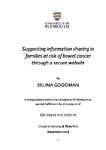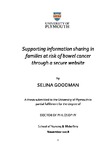Supporting Information Sharing in Families at Risk of Bowel Cancer Through a Secure Website
| dc.contributor.supervisor | Ray, Jones | |
| dc.contributor.author | Goodman, Selina | |
| dc.contributor.other | School of Nursing and Midwifery | en_US |
| dc.date.accessioned | 2019-04-15T13:12:30Z | |
| dc.date.issued | 2018 | |
| dc.identifier | 10001364 | en_US |
| dc.identifier.citation |
Goodman, S. (2018). | |
| dc.identifier.uri | http://hdl.handle.net/10026.1/13718 | |
| dc.description.abstract |
Background: Bowel cancer is a significant health threat as it is the third most commonly diagnosed cancer worldwide. Screening can detect tumours early, thus allowing treatment to reduce morbidity and mortality. However, many relatives who share a high lifetime risk of bowel cancer remain unaware of their familial diagnosis and so are unable to access genetic testing or screening. Providing family letters and verbal recommendations to patients diagnosed with a vulnerability to bowel cancer has not been sufficient to support effective communication in these families. Little is known about how electronic methods of communication could be used to facilitate communication in families affected by a genetic vulnerability to cancer. Aim: To investigate whether a secure website could support families with an increased risk of bowel cancer to share information with their relatives. Methods: A pragmatic mixed methods approach with four phases was used. First, patients at high risk of bowel cancer who had been advised to have regular colonoscopy were invited to participate in an anonymous cross-sectional survey administered online and through NHS clinical services (n=286). Second, more in depth qualitative data were elicited through telephone interviews with a purposive sample of volunteers (n=14). Third, a secure website was designed to help relatives share sensitive documents online, with content informed by the experiences and views of survey and interview participants. Fourth, reactions to the website from 12 volunteers were elicited through three phases of video recorded Think-Aloud interviews, which guided further refinement of the website. Findings: The survey showed that: 43% of those at risk were first informed of the familial diagnosis by their relatives. The majority of participants needed much more practical information after learning they had an increased risk of cancer. Key issues were: a healthy lifestyle, genetic testing, bowel surveillance and talking to children. These topics were endorsed in the interviews, which also identified four main themes: impact of the genetic diagnosis; the need for practical information; the importance of adaptation to sharing information; and appropriate communication in contacts with relatives. Reactions to the website were positive; access to tailored information, plus the opportunity to store and share personal information were all welcomed. Conclusion: A personalised web-based information resource and document sharing facility like www.familyweb.org/ could improve health communication within families. It requires further research to confirm that it is effective in practice. Such innovations could help improve early detection and treatment though increased awareness of familial cancer risk. Patients need more support from health professionals to adjust and then disseminate information about their diagnosis. | en_US |
| dc.language.iso | en | |
| dc.publisher | University of Plymouth | |
| dc.rights | Attribution-NonCommercial-ShareAlike 3.0 United States | * |
| dc.rights.uri | http://creativecommons.org/licenses/by-nc-sa/3.0/us/ | * |
| dc.subject | bowel cancer | en_US |
| dc.subject | family communication | en_US |
| dc.subject | genetic counselling | en_US |
| dc.subject | genetics | en_US |
| dc.subject | psychological adaptation | en_US |
| dc.subject | secure website | en_US |
| dc.subject.classification | PhD | en_US |
| dc.title | Supporting Information Sharing in Families at Risk of Bowel Cancer Through a Secure Website | en_US |
| dc.type | Thesis | |
| plymouth.version | non-publishable | en_US |
| dc.identifier.doi | 10.24382/34r1-6408 | |
| dc.identifier.doi | http://dx.doi.org/10.24382/574 | |
| dc.identifier.doi | http://dx.doi.org/10.24382/574 | |
| dc.type.qualification | Doctorate | en_US |
| rioxxterms.version | NA | |
| plymouth.orcid.id | https://orcid.org/0000-0002-5042-4501 | en_US |
Files in this item
This item appears in the following Collection(s)
-
01 Research Theses Main Collection
Research Theses Main




